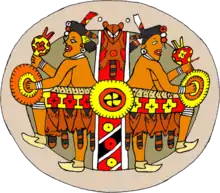Anzick Clovis burial
The Anzick Site (24PA506) in Park County, Montana, United States, is the only known Clovis burial site in the New World.
Clovis culture
The term "Clovis" is used by archaeologists to define one of the New World's earliest hunter-gatherer cultures and is named after the site near Clovis, New Mexico, where human artifacts were found associated with the procurement and processing of mammoth and other large and small fauna.[1][2]
Discovery
In 1961, while hunting marmots at a sandstone outcrop on the Anzick family property, about one mile south of Wilsall, Montana, Bill Roy Bray found a stone biface and small human infant bones that were covered with red ocher.[3] In the same area, in May 1968, Ben Hargis and Calvin Sarver of Wilsall, Montana were removing talus from the same outcrop and inadvertently found the partial remains of a one- to two-year-old child associated with some 115 red ocher-covered, stone, bone and antler artifacts[3] that are dated at about 13,000 cal BP.[4] In another location in the same area, not associated with the Clovis child, the men found a partial skull fragment of a 6- to 8-year-old male child that dated 2,400 years later.[5] Dr. Larry Lahren, a North American archaeologist from Livingston, Montana was the first researcher to examine and record the site (24PA506), artifacts and human remains at the request of Ben Hargis not long after the discovery in 1968.[6]
Human remains
For thirty years, the skeletal remains were in the private possession of a former investigator. Since 1998, they have been in the possession of one of the landowners. Because of the manner in which the site was discovered, its importance was initially dismissed[2] but subsequently confirmed.[4][6][7][8][9] The remains are known as Anzick-1.
References
- Ancient Man in North America. Denver Museum of Natural History, Popular Series No. 4. H.M.Wormington, 1949.
- From Kostenski to Clovis: Upper Paleolithic-Paleo-Indian Adaptations. Edited by Olga Soffer and N.D. Praslov. Plenum Press, 1993.
- Owsley, Douglas; Hunt, David; Macintyre, Ian; Logan, Amelia (May 2001). "Clovis and Early Archaic Crania from the Anzick Site (24PA506), Park County, Montana". Plains Anthropologist. Maney Publishing. 46 (176): 116–7. JSTOR 25669710.
- New Radiocarbon Dates for the Clovis Component of the Anzick Site, Park County, Montana in Paleoindian Archaeology- A Hemispheric Perspective. University Press of Florida by Juliet Morrow and Stuart Fiedel, 2006.
- Clovis and Early Archaic Crania from the Anzick Site (24PA506), Park County, Montana, Plains Anthropologist, 46 (176): 115-124, Douglas Owsley and David Hunt, 2001.
- Homeland: An Archaeologist’s View of Yellowstone Country’s Past. Cayuse Press, Box 1218, Livingston, Montana. Larry Lahren 2006.
- The Wilsall Excavations: An Exercise in Frustration. Proceedings of the Montana Academy of Sciences. 29:147-150, D.C. Taylor 1969.
- The Anzick or Wilsall Site: A Clovis Complex Burial in the Shields River Valley of Southwestern Montana. Paper presented at the Annual Meetings of the Society for American Archaeology, Norman, Oklahoma. 1971, Larry Lahren.
- Bone Foreshafts from a Clovis Burial In Southwestern, Montana. Science 186: 147-150. Larry Lahren and Robson Bonnichsen, 1974.
- Genetic Roots of the First Americans. Jennifer Raff and Deborah a. Bolnick. Nature 506, 162-163. 2014.
